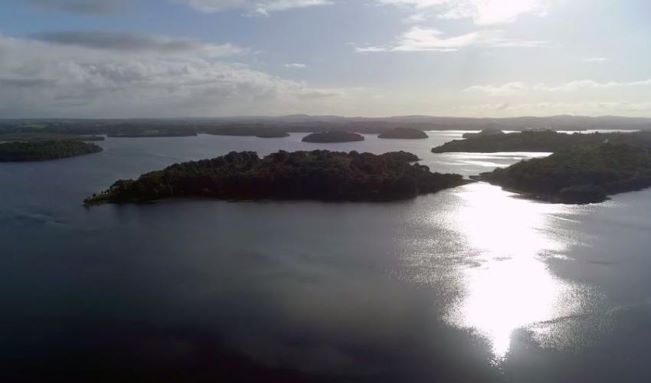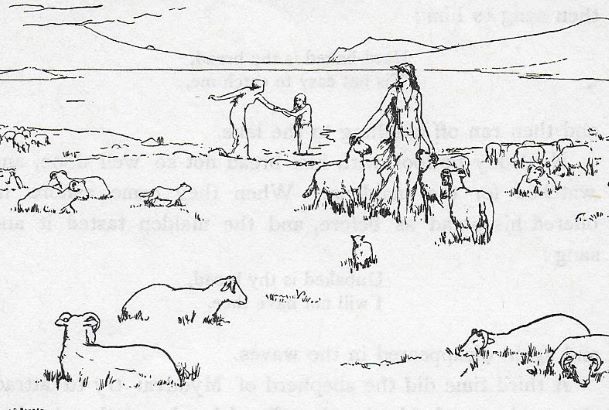In the flatlands and wetlands of County Fermanagh lies the lake known as Lough Erne, where the River Erne widens as the water flows from the mountains to the Atlantic. There are many legends surrounding the formation of the lake, and who is to know which one is true.
It was perhaps formed when the Lady Erne and her maidens were frighted by a huge giant. They ran away only to be drowned in the river, their bodies dissolving to form the lake.
Or perhaps it was formed when the giant Finn McCool scooped up a chunk of earth to hurl at a Scottish rival. The chunk landed in the Irish Sea, forming the Isle of Man. The crater left behind became Lough Erne.
Be that as it may, the land surrounding the lake provided ample feed for sheep, and it was there that a shepherd led his lambs. One day, the shepherd laid along the shore whilst his sheep sought pasture.
Suddenly, the shepherd saw three maidens rise above the dark waters of Lough Erne. Each of them shook the water drops from her hair as she walked onto the shore and wondered among the sheep. They were the most beautiful maidens the shepherd had ever glazed upon before, but he was most filled with love for the one that came closest to him. He offered her the bread that he had, and she took it and tried it.
But she sang to him: “Hard-baked is thy bread, ‘tis not easy to catch me.”
She then ran off laughing into the lake.
The next day, the shepherd brought with him bread not so well done, and he watched for the maidens. When they came ashore, he offered his bread as before to one of them.
The maiden tasted it and sang: “Unbaked is thy bread, I will not have thee.”

She again disappeared into the waves.
A third time the shepherd tried to attract the maiden, this time offering her bread that he had found floating near the shore. This pleased her, and she promised to become his wife if he were able to pick her out from her identical sisters on the following day. The shepherd was quick, though, to notice that this maiden had straps on her sandals different from the sisters.
The next day, sure enough, the shepherd correctly picked out the maiden. She then promised to be as good a wife as any earthly maiden could possibly be. Unless, she added, that he struck her three times without cause.
Of course, he promised that this could never be. He would never strike her, he said, whether or not he had cause. Upon receipt of such promise, the maiden summoned three cows, two oxen, and a bull from the lake. This was her marriage dowry, and she followed the shepherd home as his bride.
Years passed happily and three sons were born to the shepherd and his lake-maiden. One day, going to a christening, she said to her husband that it was too far to walk. He told her to go for the horses.
“I will,” said she, “if you bring me my gloves which I left in the house.”
When the shepherd returned with the gloves, he tapped her lightly on the shoulder.
“Here are your gloves,” said he.
“That’s one,” said she.
The shepherd was quite surprised at her response. He certainly remembered his vow never to strike her but was surprised that a tap on the shoulder counted as his first strike. He tried to recall all the years the two had been together and tried to remember if he had ever tapped her on the shoulder before. Try as he might, he could not recall such a time.
Sometime later, the shepherd and his lake maiden were at a wedding. With all the joy and mirth which surrounded them at this joyous occasion, she began to sob and weep.
Her husband tapped her on the shoulder and asked: “Why do you weep so?”
“I was weeping at the joy of the wedding,” she said. “But now I am weeping because trouble is upon you. That is the second causeless blow you have given me. Be careful, for the third is the last.”
The husband was careful never to strike his wife again and refrained from doing so for quite some time. There was a time, though, at a funeral for a friend that the wife burst out into loud laughter.
The husband touched her rather firmly on the shoulder, saying: “Is this a time for laughter?”
“I laugh because those that die go out of trouble,” she said. “But your trouble has come. The last blow has been struck and our marriage is at an end.”
With that, she rose up and returned to her home. Once there, she called out the cows, and the oxen, and the bull that she brought with her as dowry.
One of the cows had just been slaughtered and was hanging on the hook. But when called, it got off the hook and followed her. The oxen were ploughing in the field, but they too followed her with the plough following behind. The bull was within a fence but charged through it to join her as well.
To this very day, no cow has been slaughtered at the home of the shepherd. The fence which once enclosed the bull remains unmended. The furrow made by the oxen and the plough can been seen from the shepherd’s home all the way to Lough Erne.
And the maiden never returned from the lake.
Illustrations: The top of the page is The Shepherd of Myddvai illustration by John D. Battan from Celtic Fairy Tales by Joseph Jacobs, 1892. The photograph is of Lough Erne, courtesy of the International Union for the Conservation of Nature, Acquacross Project.
For the back-story – The Shepherd of Myddfai and The Red Book of Hergest – read the pdf link below.
